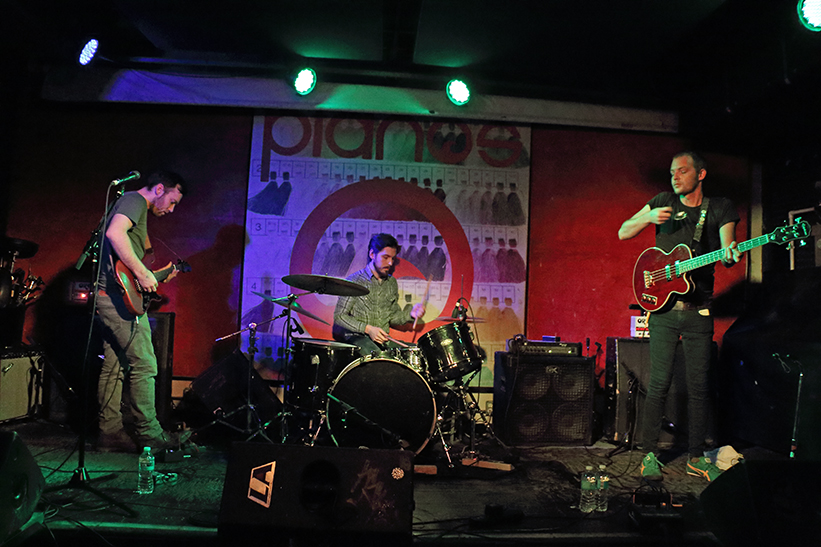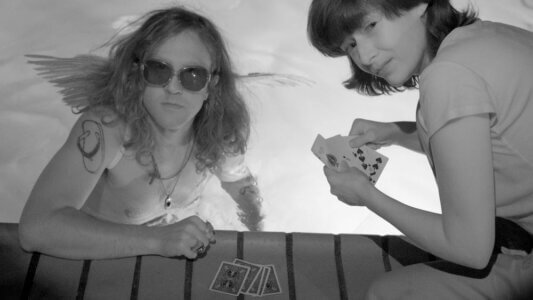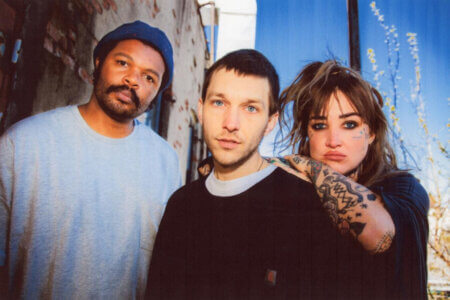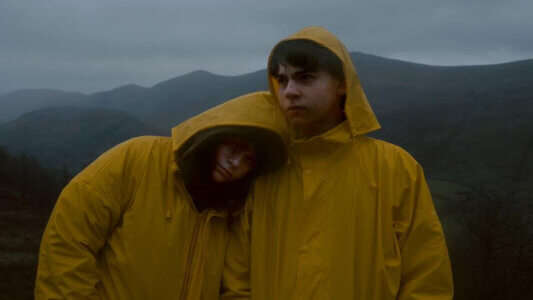Our Interview with American Wrestlers

American Wrestlers. With a title like that, it’s hard to know what to expect. And for quite a while, when the songs were first released on the internet, there was no information as to how they came about or where they were from. Then the quality of the music began to attract attention, and eventually, the story emerged. American Wrestlers is the creation of Gary McClure, a musician originally from Glasgow, with a number of previous projects to his credit. The most well-known of these was a Manchester-based band called Working for a Nuclear Free City, described as “a flawless lucid-dream trip through a thousand fantastical influences”, who released a couple of critically acclaimed albums. After McClure put out a solo album, Wreaths, which didn’t find the kind of response he’d hoped for, fortune intervened when he met his future wife, and followed her to America. Waiting for the wheels of bureaucracy to turn so he could work here, McClure thought he’d while away the time writing a couple of songs. A local pawn shop sold him a bass and a Tascam 8 track recorder, and his front room became the studio. Result. The warm, emotion-infused mix of songs starred through with guitar hooks and wry pop influences triggered a wave of record company interest. Now, the self-titled album is due out at the beginning of April. Northern Transmissions was curious. Alice Severin spoke to Gary McClure about living in another country, songwriting, and what it’s like to record without being linked to the internet.
Northern Transmissions: More information has come out about you in the past weeks. The history is so interesting – you’re from Glasgow, you used to be in Manchester making music with a fairly well-known band, and then you followed love to St. Louis.
Gary McClure: That’s right. I ended up here, it’s pretty good. Yeah, that’s true. I don’t know. I raised in Scotland, so I was a little boy in Scotland, and then my dad’s job moved me around a lot, all over England mainly, and we kind of settled in Manchester, and I guess I was there for a good 16 years, maybe or more. And myself and a good friend of mine used to collaborate and make music together. And before that I was really into the whole grunge thing. That’s how I got into music. I always wanted to write music like that and it was almost like when I met him, I was distracted from doing that. In a way I wasn’t very confident with vocals, I didn’t think I could sing. I never really tried – I tried once, and thought, singing quietly, well, that was kind of shit. (laughs) I don’t want to do that anymore. So I didn’t do it, I just stopped doing it right there. I played guitar. And also because he wasn’t fully into the kind of music I was in to – you know, we kind of crossed over with things like DJ Shadow, that kind of thing. And then like he’s into everything now, like we’re both into all kinds of music now, as the years went by. Because of that, we kind of compromised. And when I moved here, I thought well, I’m not writing music with him anymore. And it kind of dawned on me that I was free, in a way. Not that I wasn’t free before, but I was free to do what I wanted to do. It felt in a way almost like a quantum leap, you know, like that TV series, into a new life, that’s what it felt like. It was really weird. So these ways of life were gone, and I felt like a new person. It’s almost like this record had been waiting to be made since I was 14 or 15 I guess. You know what I’m trying to say.
NT: I don’t know if you agree, but I think you come to a new country and the brakes are off. Everything is so different, you feel like you’re on another planet. Without any kind of anchor at all. Did you feel that way when you were starting to write songs? Were you inspired by living in America?
GM: In a way, it was almost like I was writing for the first time, if that makes sense. But I’d also had all the practice of writing before. I think, we’d written so many things together, me and this guy Phil. I think one day we looked on his computer and he found 2000 unfinished ideas. So we did a lot. But it almost felt new, like I was a new person writing their first record. It’s full of contradictions, this album – like much of life. I feel like much of it was accidental, but at the same time I know a lot of it was calculated. But I can’t quite put my finger on which parts were calculated and which parts were accidental. Because I don’t really have a process, it’s not like I go to a room and I sit down and go, right I’m going to write now. There’s thoughts going around in my head as I do my daily stuff. And it just kind of comes together in a way. And sometimes I pick up a guitar and play. So it’s hard for me to say, ok, this happened then and this is when I decided something and it felt like this. You know? A lot of it was kind of, in the wind, I guess.
NT: That makes sense. I always think there is a sort of narrative built around things after the fact, that at the time you may not realize, or it may not exist at all.
GM: Yeah, absolutely.
NT: When you write songs, are there instruments that you write on first? Maybe guitar, because there’s so many great guitar hooks and pieces in the songs. Is that what starts you off?
GM: Well, I’m a terrible pianist. I’m like a one finger pianist. My wife, actually, is a great pianist. I should have asked her to play on some. I didn’t think this was something that was going to be released. So it was always – I don’t know, I don’t know what it felt like. I always wrote on guitar because I’ve always been a guitarist, I guess. And, I almost deliberately tried to simplify it, everything. This album was always about – it was almost like…like what I’m going to say now, isn’t kind of true, but the way things are. At the time it felt like no one was writing songs anymore. Or songs as far as I knew them. Or songs which had good ideas, strong ideas, and were honest songs which delivered the way a song should. I almost felt there was a lot of people who were giving the appearance of there being songs. You know when you listen to them, there wasn’t really anything good apart from technique, craft. So I think at the time, I said, ok, it’s almost like show everybody how to write a song. Not in an arrogant way, because I’m not an arrogant person. But, like I bet I can just…I felt like I could get away with doing the most simple things, the most rudimentary form of a song, and it would still deliver better than a lot of things that were going on. So it was like, ok, here’s the most simple drum machine beat there is. And it’s just bass drum, snare drum, bass drum, snare drum. Then, ok, let’s just have the simplest guitar chord – an E and a G/A and then get a lot of songs like that. And I was actually trying to keep the 8 track recording very under control and clean. And just because I’m a terrible producer it ended up being kind of noisy in a lot of places. Does that make sense?
NT: Yes, makes perfect sense. I tend to think a lot of great songs are very simple and have that quality where they jump out at you, it seems so obvious, and that makes a great song.
GM: Yeah, you’re right. And I was getting the feeling as well that – I don’t think this era is any different from any other era, I think it’s always been that way. But a lot of songs and a lot of music is about – look at me, and here’s me, and the music is really a vehicle to promote the person as some kind of star or something, or a weird character. A lot of people do that kind of thing, but – you know songs are things that people sing. That’s what a song’s for. And it’s not about the person who writes it, or being famous or something, or making some weird artistic statement. It’s supposed to be something with a common idea, that everyone can understand, so everyone can sing it. That’s what a song is. And it seems such a simple, stupid thing to say but it’s almost like people have forgotten that. So I really wanted strong melodies, and simple melodies. Sometimes that’s the hardest thing to do. People criticize a band like Coldplay, or something, or Oasis, but it’s really hard to make a popular song in a simple way. You know, not everyone can do that.
NT: No. And it’s beyond simple in a way, because there’s an emotion behind it. Your songs – they have this kind of interesting twist, or hook at some point in them that catches you off guard, slightly, in a really good way. Like that’s a great chord progression, or that’s a great sound.
GM: Thank you very much.
NT: One thing I thought while listening to it, and I wanted to ask you about the 8 track, is that it seems there is a sort of depth and richness to it. You know, we’re so used to hearing things that are so clean and so digital. And something about all of this had the feel of listening to the radio in the middle of the night. Where it’s not clean, there’s a warmth to it.
GM: Well, thanks. Yeah, a lot of modern sounds are very glassy and brittle, aren’t they? And when you say about the radio at night thing, there’s a very, there’s an even more personal feeling, and it’s a nice feeling, of having an 8 track, where instead of a computer where you can imagine it’s linked out to the whole world, you’ve got this little one machine, and it’s yours, you know? And it’s just your own little private world, I think. You feel more like that, free to make something up.
NT: That’s a good point.
GM: I’ve always wanted to give off that private feeling.
NT: I was thinking that maybe you’d gotten to hear lots of radio here. You know, once you get out of the city, radio in America is still pretty firmly, at least in places I’ve been, back to the 70s, in a way, 60s 70s maybe some of the 80s a little bit. Deep country, like up in Maine or something like that. That kind of middle of the night radio feeling where it’s just you and the music but also this timeless quality.
GM: That middle of the night radio stuff, did that come across?
NT: Absolutely.
GM: That’s weird, because when I moved here, my wife and I used to spend a lot of time driving at night with the radio on. We would like go across Missouri. There was always something to do, go and see her folks, or something. So we spent a lot of time doing that actually. So we’d listen to the radio, like The Church, you know that band? And Elvis. We used to listen to a lot of Elvis during that period. I don’t think any of it sounds like Elvis, but. And she had a cassette as well, which had a lot of 70s and 80s kind of power pop stuff. Blue Oyster Cult.
NT: That’s really interesting. It doesn’t sound like that necessarily, but it just makes you think of it. Bit and pieces of different songs that have been really epic, over a long time.
GM: Some of it can be good. Some of the radio here is kind of terrible but… I think I’ve been here for like a year straight now and I think every day by the hour they play the same song by Elton John. (laughs) That stuff’s on a loop, it’s been on a loop since 1979.
NT: That’s exactly it.
GM: Yeah. (laughs) You can imagine the radio station, and there’s a skeleton wearing the DJ’s clothes. They’ve left the tape on and no one’s realized the guy’s dead.
NT: There’s one tree, and a windswept bush and an antenna in the middle of this field.
GM: Yeah. (laughs)
NT: I was going to ask you about St. Louis and what it’s like being there at the moment with so much going on.
GM: St. Louis is a crazy place, it’s really crazy. I couldn’t imagine there being a place where there’s more crime. I know there are places like that but you hear the news every day and it’s like 10 more things have happened. Like I think two days ago some guy ordered a pizza and the pizza guy comes up and they argued about how much money it was, and the guy shot him, the pizza delivery driver, then got in his car and there was a car chase, and he was throwing homemade explosives out the window at the police cars. It was like Grand Theft Auto. And that’s just one thing on one day. It’s mental, it’s completely mental. Ferguson is further north, it’s close, but I don’t really see anything here. There was one protest on Christmas Eve. But we don’t see much here, in the way of a direct effect. But it’s so blindingly obvious. The racial thing is very obvious, especially to an outsider. You go into most places of business and you find that most of the low level workers are black and most of the bosses are white. You find that in a lot of places actually. You find there’s a lot of rich areas, and most of the rich areas are populated by white people and a lot of the low income areas are populated by black people. And the findings, they found out that it was institutionally racist, didn’t they? The police department. It’s 2015, man.
NT: It’s unbelievable that this stuff still goes on.
GM: Yeah, it’s crazy.
NT: You found some instruments in a pawn shop. What did you find, and was there something about the sound quality of the instruments?
GM: When I came here, I didn’t realize I was going to be staying, so I didn’t bring anything with me. While waiting to get my employment authorization, so I could work, it was something to do, to come up with some songs. So my wife has a piano and a nice guitar. So I bought a bass guitar and I just used a drum app for the drum machine from my phone. I was trying out drum machines recently, for the live show, just to see if I could find one which would work. I wound up getting a live drummer instead. But when I was looking I realized that none of these drum machines could do what I wanted. The drum machine app was like completely perfect. You could spend hundreds of dollars on these drum machines you could buy, and this was just a little thing, you got for free on your phone. It’s weird.
NT: What did you like about it better than the other ones with all the bells and whistles?
GM: It had more bells and whistles, I guess. Yeah. Surprising. I think was the idea of electronic corruption, I guess. Like the idea of the 8 track. I couldn’t afford, for a start, to buy a new computer set-up. And I’d just had fun with an 8 track when I was a kid, so let’s just do that again, it’ll be fun.
NT: When you wrote songs – like “Wild Yonder” has this kind of yearning quality, and the chorus to the song has such a pull to it. What were you thinking when you were writing? How did that come about?
GM: What was I thinking? I don’t know. That was one of those songs where I don’t know what it was about. Sorry.
NT: And “I Can Do No Wrong” which is one of the songs that’s been released, sounds like a natural single. It’s got the great chorus and the guitar flutter of notes.
GM: The flutter. Yeah, the flutter is…I’d actually opened the panel that covers the tape, and I’d shake it with my hand, so it makes the whole song wobble, just a little bit. That’s what that effect is. Yeah, “I Can Do No Wrong” is about becoming the leader of a country, about becoming a president. That’s what that is supposed to be about. This idea that, you know, that everything you do is right. And it’s also about anyone who feels they can do no wrong, I guess. It’s not up to me to say what it’s about.
NT: You sent it out to a number of people.
GM: I thought it was ok. “I Can Do No Wrong” – I can kind of go for that, it’s kind of catchy. I thought, I like that one. And the rest – just kind of like add-ons. People might like them. But that one – people might like. I don’t know. It’s quite a good song. I’m still convinced that no one beyond me and you is going to hear it. You know? That’s just – and I’m ok with that.
NT: That feeling of sending things out into space and wondering what is going to happen is so strange. But the album is going to come out April?
GM: April 6. Yeah, it’s pretty close. What else is coming out this year? The Wrens are back. Do you know them? You’ve got to check out the Wrens. They’re a phenomenal band. It’ll be their first album in like, twelve years or something. I’m really looking forward to it.
NT: I will definitely check it out. So you’ve been playing some free shows in St. Louis, and you were playing in the fall. Are you planning to go on the road again and do some live shows?
GM: Yeah, I currently have a European and a US booking agent – two separate ones and they’re working on tours for in a couple of months’ time, I think. June July, I guess. There’ll be a full North American tour, I think, and I might do a support tour first. Then we’ll be doing like festivals and European festivals, doing the UK, capital cities in Europe, so hopefully out there a long time.
NT: Do you know when you’ll be announcing it?
GM: As soon as I hear. But very soon. Everyone’s caught up in SXSW this week.
NT: Everybody’s there, right?
GM: Yeah, except me. I’m still at work.
NT: I saw where you talking about having the day job to keep everything going, and it struck me what you said when they asked you if would you give up the job, and you were surprised that they would ask. Which I thought was right.
GM: Yeah, I was. It was a stupid question, really.
NT: I thought, yeah, that’s it – to have that feeling. Well of course I would give it up.
GM: Well, I mean yeah, you’re going to stay in like, loading boxes on to the truck instead of going on tour? (laughing) That’s madness. Yeah, I mean, the world’s changed so much. It’s also quite a fad thing these days, you’ll find especially on a lot of low level record labels. I think they rely on the fact that some bands have got mum and dad to kind of pay their way on the road, you know? I think that’s…if that’s true, if those are the only bands that are coming through, because those are the only ones the company can afford to tour, they can’t put any money into it, then it’s a sad state of affairs, isn’t it? If that starts happening. Then you’re just going to get this kind of nothingness. Fluffy terrible songs without any experience behind.
NT: With nothing at risk, it’s hard to have any emotion. But there does seem to be this expectation that people are going to do things for free.
GM: And there’s something I think we miss nowadays. I remember, I think it wasn’t the last Smashing Pumpkins album, but the one before. I’m a big fan of theirs, by the way. I always have been. I’m sick of people saying “are you still listening to that band?” But there’s just something about Billy Corgan I just can’t let go of. And he’s mental and everything. But I think it was called Oceania or something and I thought, shit, I haven’t heard production like this in so long. And I forgot how production used to be. Record companies used to be able to do that. They used to be able to afford to send bands to a studio, just young kids, or anyone, and just say, ok what do you need? Do you need an orchestra? Ok, let’s get the orchestra in. 50 piece orchestra in, ok play over that, see what you come up with. And what else do you need? Oh, you need a fire engine, and they’d send over a fire engine. And you could do all these insane things. Insane experiments. And these days you can’t do that, because no one’s going to pay for it. And I think we miss out on that now. People don’t realize how much they’re missing out on by not paying for it, for music.
NT: I think you’re right. You’ve got to have the space to experiment, and you need support for that.
GM: Last year I think I spent 9.99 a month for a popular streaming service, you know, the one with the green bulldog. (laughs) And at the end of the year, I was like, shit, what did I listen to on this? I couldn’t remember anything I’d been listening to. I thought, I could have bought 12 really good vinyls for that. And I could have had those forever. Instead of some terrible streaming service that makes some guy rich. They don’t pay the artist anything.
NT: It’s like a pyramid the wrong way – the people who don’t create anything get everything.
GM: Yeah.
NT: And five albums that you return to you, or that inspire you?
GM: My favorite five albums, like ever?
NT: Well, at least today’s favorite.
GM: Yeah, five albums. You’ve stumped me. Ok.The first Red House Painters album. It’s the one with the rollercoaster on the front – there’s no title for it. I sometimes think it’s my favorite album ever. It’s a shame that he’s only getting recognition for it now – he did in the past but he deserved more, I think.
Pearl Jam – 10.
I didn’t like music until my brother bought Nevermind. I heard one song, it was almost like something inside me had ice cold water thrown on me. It really woke me up. I can’t say strongly enough how that changed my life. So anything by Nirvana, and anything by The Smiths, I guess.
The first Foo Fighters album, that was really big for me. I loved Hole – Live Through This – Courtney Love’s album. I think she was an amazing songwriter. People don’t realize, she changed a lot of stuff in the music world. She was really influential for that. Soundgarden, anything by them. Also, like Marvin Gaye – What’s Going On – that might be the best album ever made. The Clash – London Calling – that could be the best album ever. I wish I had more time to think.
Alice Severin
Latest Reviews
Tracks
Advertisement
Looking for something new to listen to?
Sign up to our all-new newsletter for top-notch reviews, news, videos and playlists.









